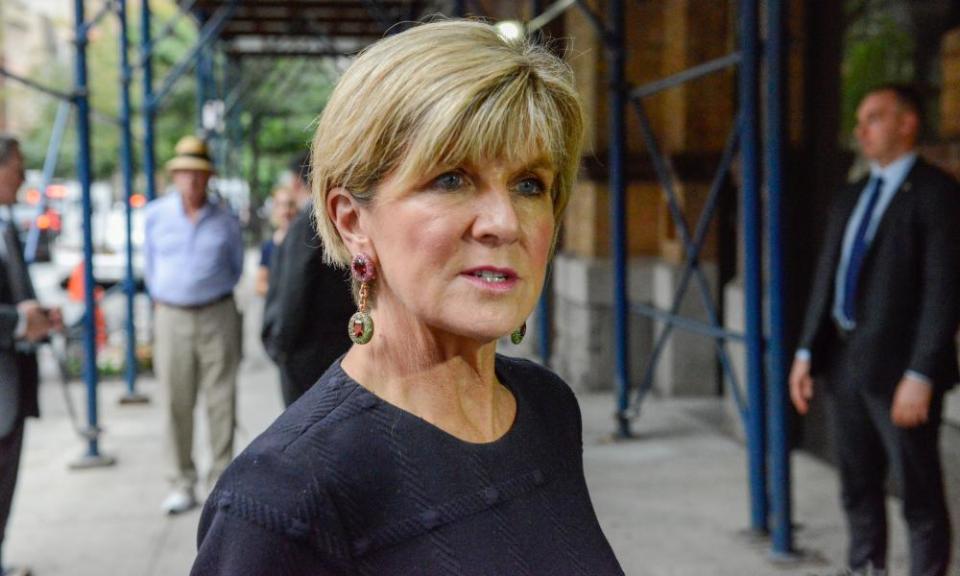Julie Bishop says Rohingya must be protected despite 'cash for return’ policy

Australia’s foreign affairs minister, Julie Bishop, has insisted the international community must act to stop the lives of more Rohingya Muslims being put at risk in Myanmar but Australia is still encouraging Rohingya refugees held on Manus Island to return to the country, offering tens of thousands of dollars in inducements.
In New York, where she is attending the United Nations general assembly, Bishop said at a multinational meeting of ministers there “was unanimity in the view that the violence must end and that there be a ceasefire”.
“And we emphasised the need for humanitarian support to get through and also that the Rohingya must be able to return home.”
Meanwhile the former Australian prime minister Kevin Rudd has defended Aung San Suu Kyi’s failure to denounce ethnic cleansing, telling the ABC’s 7.30 on Tuesday that she was in a “total dilemma” because she could not control the military.
Rudd said that Suu Kyi’s speech was being monitored by the Burmese military, which was “looking for any pretext to return to full military rule” and noted that she did not reject the allegation of ethnic cleansing.
“I interpret the speech with a degree of more subtlety than perhaps others may read it,” he said. “[In effect she said] ‘I’m not repudiating what the Human Rights Commission said at all. I want to get to the bottom of this.’ The coded language is the military have run amok.”
Rudd accepted that Suu Kyi “could’ve handled [the situation in Rakhine state] better”.
“The bottom line is this, moral authority is one thing. He who controls the barrel of the gun in Myanmar is another.”
Australia has pledged a further $15m in humanitarian support, particularly to Bangladesh, which is hosting those who are fleeing.
More than 400,000 Rohingya have fled Myanmar for neighbouring Bangladesh over the past month, fleeing a scorched earth campaign of violence by the Myanmarese army that has reportedly included summary executions, children being stabbed to death, homes torched with families locked inside and landmines laid ahead and behind of fleeing civilians.
The Myanmarese military has described its actions as a “clearance operation” seeking out terrorists and Suu Kyi did not name the military in a speech to diplomats in the capital Naypyidaw.
“We too are concerned,” she said of the violence. “We want to find out what the real problems are. There have been allegations and counter-allegations. We have to listen to all of them.”
Over the Naf river, which separates Myanmar from Bangladesh, a new humanitarian crisis looms in the country of refuge as hundreds of thousands live in makeshift camps without sufficient food, water and sanitation.
But the Guardian revealed on Tuesday that – in the midst of Myanmar’s crisis –Australia was continuing to offer up to $25,000 to Rohingya refugees currently held in Papua New Guinea under Australia’s offshore processing asylum policy, as an inducement to abandon their protection claims and return home.
Up to seven Rohingya men – some of whom have been recognised as refugees – have agreed to return. Australia’s immigration detention regime in PNG has been marked by violence, including murder, medical neglect leading to death, systemic mental health issues and suicide, harsh conditions and privation.
“I don’t want to die in PNG. I prefer to die in Myanmar,” one of the men, Yahya Tabani, told the Guardian. “Probably Buddhist people are going to kill me as soon as I arrive in Myanmar … Australia doesn’t care if we live or we die.”
He has been promised $25,000 by the Australian Border Force if he agrees to return to Myanmar.
Australia’s encouragement of Rohingya repatriation has been condemned by human rights groups and aid agencies.
“The Australian government is currently offering a financial incentive to Rohingya refugees imprisoned on Manus Island to return to Myanmar. We need to show compassion, halt this process and give them the right to settle here,” Marc Purcell, the head of the Australian Council for International Development, said.
“Historically, the number of refugees Australia has resettled from Myanmar has been extremely low. We urge the Australian government to look at an increase to Australia’s humanitarian intake, with specific consideration to vulnerable people who have fled violence and persecution in Myanmar.”
Amnesty International called on Australia bring an emergency intake of Rohingyan refugees into Australia.
“The Australian government should end its hypocritical ‘cash for return’ policy for Rohingya people on Manus Island and Nauru,” Michael Hayworth, campaigns manager at Amnesty International Australia, said. “Offering Rohingyas money to return to a country where there is a current campaign of ethnic cleansing against them is unconscionable.
“Despite strong statements against the violence of the Rohingya people by foreign minister Bishop, the recent record of Australia resettling Rohingyas has been nothing short of shameful, with only 37 resettled since 2013.”
The director of the Edmund Rice Centre and president of the Refugee Council of Australia, Phil Glendenning, said the Australian government had a responsibility to ensure that people who had sought sanctuary in Australia were not returned to harm.
“No reasonable person could claim that Myanmar is a safe place for Rohingya people at present,” he said. “The situation in Myanmar is absolutely appalling and has been described by the United Nations as ‘textbook ethnic cleansing’.
“For the Australian government to even be contemplating deporting or removing Rohingya people back to Myanmar is not only a complete abrogation of our international obligations but also a complete denial of basic human decency.
“Make no mistake, if these people are sent back to Myanmar at this point in history, the Australian government is playing fast and loose with their lives.”
Bishop told Reuters earlier on Tuesday that she wanted to hear Suu Kyi offer a solution “to what is a tragedy of enormous proportions”.

 Yahoo News
Yahoo News 